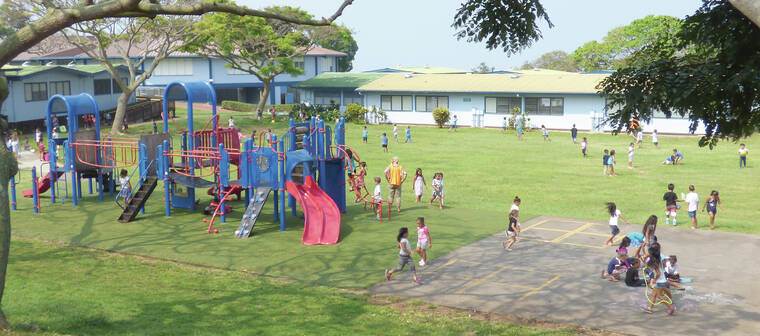Lawmakers are considering a bill to install photovoltaic panels over playgrounds at all state Department of Education schools.
Not only would the move shield children from the harmful effects of ultraviolet (UV) rays from the sun, installing the solar arrays would also help offset electricity costs for the department, according to House Bill 896.
The state paid 42.15 cents per kilowatt-hour in 2022, up from 31.11 cents in 2021, and well over the national average of 12.81 cents per hour.
“As you know, energy cost has gone significantly higher. It’s the two sides of the same coin: we need to generate more and we need to figure out a way to cut. And, this may be the way to do it or one of the ways to do it,” Randy Tanaka assistant superintendent for facilities and operations, told a Joint House Committee on Energy and Environmental Protection and Education on Thursday. “But, we think this is a good idea.”
Further, any power generated beyond what the school uses could be “sold” back to the grid or stored in batteries for future use — or even charging electric buses or vehicles.
“We’ve had a number of discussions regarding batteries and charging the batteries, because schools aren’t open on the weekend, it closes at 4 p.m. so all that generate is not used,” Tanaka said. “We’ve had some challenges with the batteries — we’re trying to figure that out, but that would be another alternative to store energy.”
House Bill 896 was co-introduced by Maui Reps. Elle Cochran, Terez Amato, and Mahina Poepoe; Big Island Reps. Jeanne Kapela and Nicole Lowen; and Oahu Reps. Natalia Hussey-Burdick, Darius Kila and Amy Perruso; with sponsorship by Oahu Rep. Jenna Takenouchi. A companion bill in the Senate, Senate Bill 1125, passed its first reading on that chamber’s floor but has yet to be head by a committee.
Installation of photovoltaic panels over playgrounds would likely occur primarily on the west — or leeward — side of the islands, including areas like Kona and Ka‘u on Hawaii Island and Waikiki on Oahu, Tanaka said. Priority could follow a system like was used when the state installed air conditioning at schools across Hawaii.
The cost to install ground-based photovoltaic systems across the state hasn’t been determined. When asked about the price tag of such an endeavor, Tanaka responded it would cost “lots” with the actual price tag for a system dependent on square footage.
Lowen (D-North Kona and South Kohala), who heads the Committee on Energy and Environmental Protection, urged the department to look into funding mechanisms available via the Inflation Reduction Act for PV systems for state facilities, and then questioned why even just a cover for a play court runs taxpayers millions of dollars.
“I really think it’s hard to understand why the cost is $3 million, $4 million, $5 million to put a cover over a play court. And I know that you offered to give us the numbers and explain why, but I think to many of us here, and in the eyes of the general public, there is no way to justify it and we have to figure out a way to do better. Those kind of price tags are not feasible. It’s not something the state can afford,” Lowen said.
Tanaka said the numbers that come back are due to the state’s procurement and bidding process.
“Then something is wrong in the system that needs to be fixed and that’s part of what your guys job is, I think,” Lowen said.
After a short recess, the joint committee reconvened and voted to pass the measure with amendments requesting the department to report back on which facilities would be best-suited for the systems, as well as which sites would receive priority by county.
“We’ll come back to this idea of funding it after we have some idea of what we’re looking at may be some kind of cost analysis I just want to restate we need to figure out why the price tags we get from DOE are so astronomical because they are hard to justify,” Lowen said.
House Bill 896 next needs to pass a reading on the chamber floor and secure a hearing before the Committee on Finance to remain alive this session.






